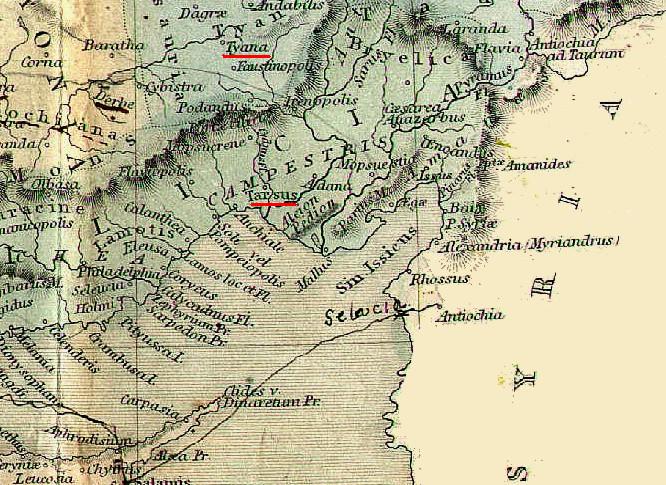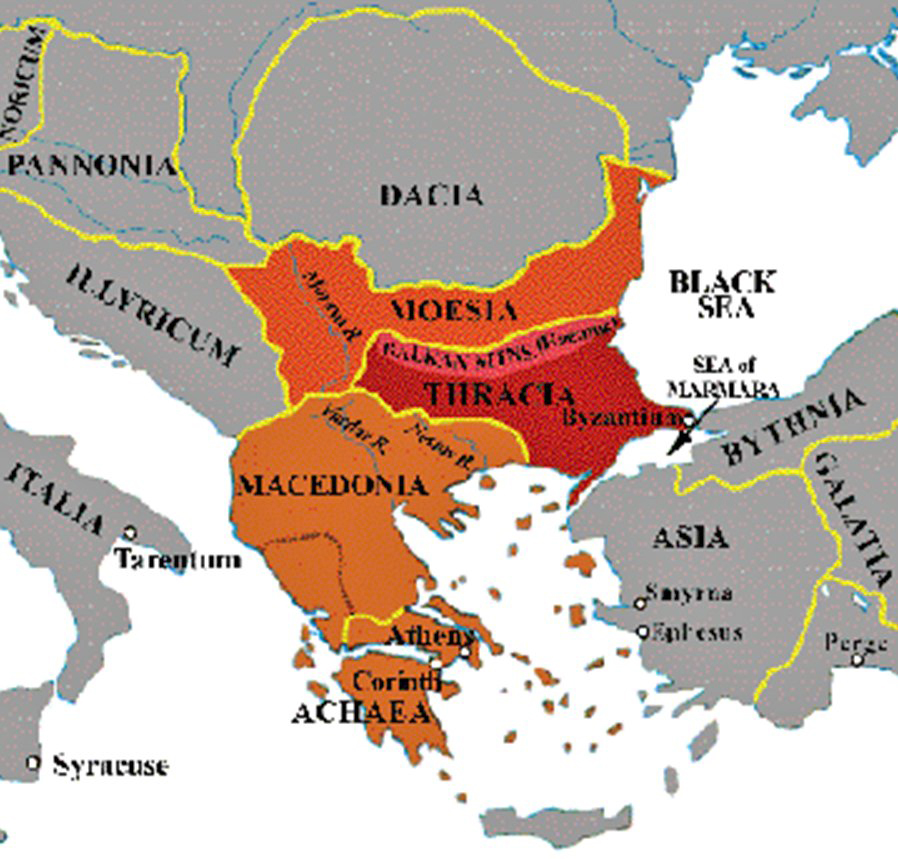"Life of Apollonius of Tyana" by Philostratus
Book 1
1.4 Apollonius was born to a wealthy founding native Tyanian family
"Apollonius' home, then, was Tyana, a Greek city amidst a population of Cappadocians. His father was of the same name [Apollonius] and the family descended from the first settlers [northern Greek Thracians?]. It excelled in wealth the surrounding families, though the district is a rich one."
- Philostratus in translation
Could this be translated
"The district is a rich one and the surrounding families excelled in wealth." ??

Caption: "In greek 'Tyana', in Latin 'Tyana'. Ancient city in Asia Minor, Cappadocia, at the center of today's Turkish Kemerhisar [district], 25 km SSW of Nigde. Existing [Surviving the] Hittite invasion, under the first Hittite king Labarna (c.1680-50 BC) it became a great religious center. Later it belonged to the Phrygians and Persians. It became a Roman colony in sec. II [100-200 CE?] and bishopric [ie: a district under a bishop's control; a diocese] in the first half of the next century [200-250 CE?] then passed to the Arabs [sic] (sec. VIII-IX) [800-900 CE?]. It was finally abandoned around Mille [1000 CE? after which it was absorbed into the Ottoman Empire 1259-1924 CE]. It is believed that there [in that place] was born Apollonius of Tyana, a philosopher neopitagorico [by neo-Pythagorean - translated from the Turkish] [in the first ??] century AD."
Source: http://www.summagallicana.it/lessico/t/Tiana.htm
Translated from the Italian using https://translate.google.co.nz

Source "Ancient map of Thrace"
Source Modern day map showing how ancient Thrace would have covered southern Bulgaria, north eastern Greece, and far western Turkey beyond Istanbul/Constantinople/Byzantium.
Tyana - from the "Summa Gallicana"
Tyana (or Tyanna) was an ancient city of Anatolia, in modern south-central [eastern] Turkey. It was the capital of a Hittite kingdom in the 2nd millennium BC, and had a long history as a Greek city state... Tyana was a queen in Anatolia.
Tyana is probably the city referred to in Hittite archives as Tuwanuwa [and the region as 'Kizzuwatna' ? See the second map above]. In Greek legend the city was first called Thoana, because Thoas, a Thracian king, was its founder (Arrian, Periplus Ponti Euxini, vi); it was in Cappadocia, at the foot of Taurus Mountains and near the Cilician Gates (Strabo, XII, 537; XIII, 587). Xenophon mentions it in his book Anabasis, under the name of Dana, as a large and prosperous city. The surrounding plain was known after it as "Tyanitis" [and in later times, the Konya Plain whereupon is also found the ancient the city of Çatalhöyük which flourished from c.7500-6500 BCE.]
[My observation is that large portions of the Konya Plain have become subject to desertification. I feel there are three possibilities for this - (1) the ongoing ravages of war over many centuries (including the Crusades), impacting the region; (2) the removal of native trees and plants from the mid-19th century onwards (as all over the world) in an attempt to mechanise farming; (3) a change in environmental conditions due to the natural cycling of Earth through Ice Ages and warmer periods. We are currently in a naturally occurring "warming" period. We now take note of this plain as being a fairly fragile environment. My belief is that it was a flourishing, abundant, fertile floodplain (fed by the Taurus Mountains) in times gone past. What else could account for the plain being such a heavily populated area from 8000-5500 BCE? There must have been a way to sustain human life - ie: through food production.]
Image - Konya Plain, eastern modern day Turkey
[Tyana] was in a strategic position on the road to Syria via the Cilician Gates. It is the reputed birth-place of the celebrated philosopher (and reputed magician) [sic] Apollonius of Tyana in the first century. Under Roman Emperor Caracalla the city became "Antoniana colonia Tyana". After having sided with Queen Zenobia of Palmyra it was captured by Aurelian [Lucius Domitius Aurelianus Augustus, ie: not Marcus Aurelius] in 272, who would not allow his soldiers to sack it, allegedly because Apollonius appeared to him [posthumously], pleading for its safety.
In 371, Emperor Valens created a second province of Cappadocia, Cappadocia Secunda, of which Tyana became the metropolis. The ruins of Tyana are at modern Kemerhisar, three miles south of Nigde (in the former Ottoman province of Konya); there are remains of a Roman aqueduct and of cave cemeteries and sepulchral grottoes.
Source: http://www.summagallicana.it/lessico/t/Tiana.htm
Original Philostratus quotes sourced on Livius:





